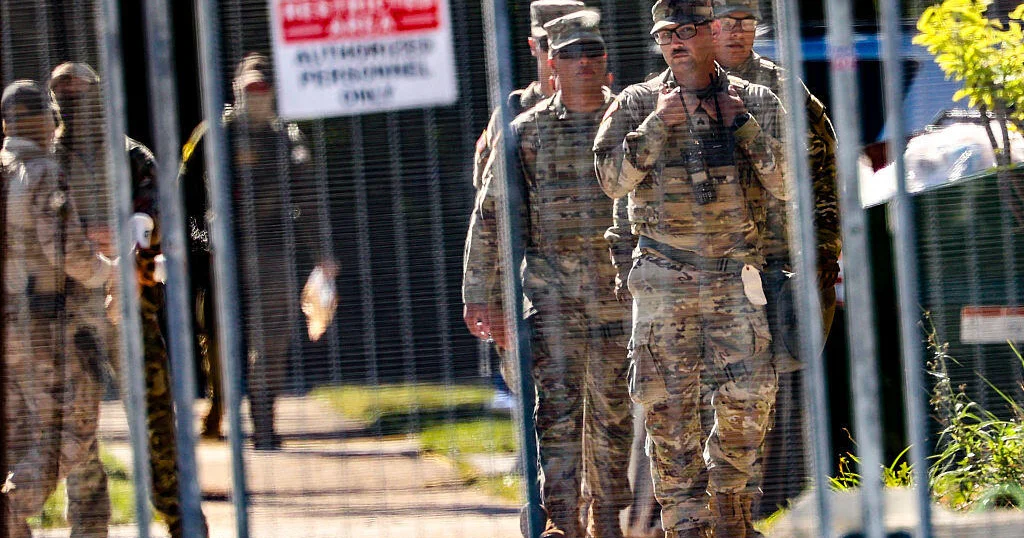A federal appeals court recently issued a significant ruling that affects the deployment of National Guard troops in Chicago amidst ongoing protests regarding U.S. Immigration and Customs Enforcement (ICE) facilities. The decision upheld a previous ruling denying a request from the Trump administration to deploy troops in the city while allowing them to remain under federal control. This ruling has implications not only for Chicago but also amid similar tensions in other cities such as Portland, Oregon.
As protests continue to unfold, local officials and the federal government remain at odds over the deployment of military resources to handle civil unrest. The court’s decision is part of a larger narrative involving legal challenges surrounding federal authority and state autonomy during tumultuous times.
| Article Subheadings |
|---|
| 1) Court Ruling on National Guard Deployment |
| 2) Details of the Court Order |
| 3) Perspectives from Officials |
| 4) Similar Situations in Other States |
| 5) Implications for Future Deployments |
Court Ruling on National Guard Deployment
The Seventh Circuit Court of Appeals recently blocked the deployment of National Guard troops in the Chicago area. This ruling came during a time when protests against ICE facilities have escalated, prompting significant unrest in various communities. The court upheld a ruling by U.S. District Judge April Perry, which rejected a request from the White House to send National Guard troops into Chicago streets. Instead, the court granted a request to maintain federal control over the deployed troops, issuing an administrative stay to earlier rulings concerning the federalization issue.
Details of the Court Order
The appeals court’s decision was specific in its implications. It effectively barred the National Guard from taking to the streets of Chicago, Broadview, or anywhere else in Illinois. The order highlights the court’s intention to allow local law enforcement to manage the protests, effectively supporting the state’s authority over federal intervention. Approximately 200 National Guard troops from Texas and another 300 from Illinois had been sent to the region under Title 10, as part of federal efforts to protect federal officials and resources amidst the escalating violence and protests.
Perspectives from Officials
In the wake of the court’s ruling, local and state officials expressed their reactions. Illinois Attorney General Kwame Raoul stated, “The court’s order today keeps the troops off the streets… This is a victory for our state.” The emphasis on community policing reflects a broader sentiment among local authorities who believe they are best equipped to navigate the unrest within their jurisdictions. Meanwhile, a spokesperson for the White House, Abigail Jackson, voiced strong support for the administration’s decision-making, highlighting the need for federal oversight in instances of “lawlessness” that threaten federal assets.
Similar Situations in Other States
This judicial ruling in Illinois is not isolated. A similar scenario has unfolded in Portland, Oregon, where federal judicial intervention blocked the deployment of National Guard troops as well. A temporary restraining order was issued by a Trump-appointed federal judge, preventing any deployment of Oregon’s National Guard or forces from other states. This reflects a growing tension between the local actions to address civil unrest and federal responses looking to manage national stability.
Implications for Future Deployments
The implications of these court rulings could have lasting impacts on how future protests are handled nationwide. Local authorities may feel empowered by the court’s decision to refuse federal support, shaping a landscape where states maintain control over law enforcement tactics. If more courts lean toward supporting local governance over federal military intervention, it could redefine the relationship between state and federal authorities when addressing civil unrest.
| No. | Key Points |
|---|---|
| 1 | A federal appeals court blocked the deployment of National Guard troops in Chicago amid ongoing protests. |
| 2 | The court ruled that troops can remain under federal control instead of being deployed to city streets. |
| 3 | Local officials expressed satisfaction with the ruling, emphasizing state control over law enforcement. |
| 4 | Similar legal battles are occurring in other states, raising issues of governance during unrest. |
| 5 | The implications of the ruling could redefine state and federal relationships in future protests. |
Summary
In conclusion, the recent ruling by the Seventh Circuit Court of Appeals represents a pivotal moment in the ongoing clash between state autonomy and federal intervention during civil unrest. The court’s decision to block National Guard deployment while allowing federal control marks a critical stance favoring local governance. As this situation unfolds, it may set important precedents for how similar issues are approached across the United States in the future.
Frequently Asked Questions
Question: What was the main finding of the Seventh Circuit Court of Appeals?
The court blocked the deployment of National Guard troops in Chicago and upheld the ruling that these troops should remain under federal control.
Question: How did local officials react to the court’s decision?
Local officials, including Illinois Attorney General Kwame Raoul, expressed satisfaction with the ruling, viewing it as a victory for state and local governance during protests.
Question: Are there similar legal challenges in other states?
Yes, a similar legal challenge has emerged in Portland, Oregon, where a federal judge has blocked the deployment of National Guard troops amid civil unrest.


